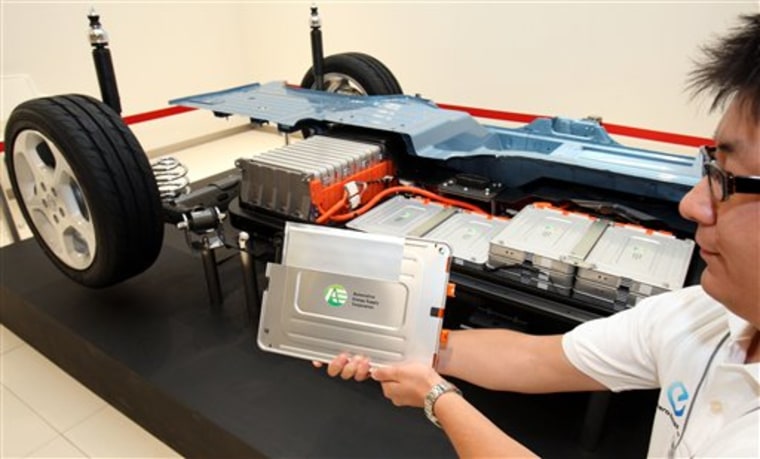Nissan Motor Co. showed off its super-quiet, zero-emission electric car Monday — a key green offering for Japan's No. 3 automaker, which has fallen behind in hybrid technology.
Nissan showed the prototype in a Tiida compact that is already on sale. It is withholding the unveiling of the electric car's exterior design until the Tokyo-based manufacturer opens its new Yokohama headquarters Aug. 2.
"Nissan will be a leader in zero-emission vehicles," Chief Operating Officer Toshiyuki Shiga said ahead of a test-drive event at the automaker's facility in this Tokyo suburb. "EV is the answer."
Sales of Nissan's electric vehicle are scheduled to begin in Japan and the U.S. next year. Nissan says it plans to mass produce zero-emission cars globally from 2012. Until then, Nissan will produce all initially targeted 100,000 units at its Oppama plant, including export models.
Nissan has received a $1.6 billion loan from the U.S. Department of Energy loan to modify its Smyrna, Tennessee, plant to produce electric vehicles and batteries to power them, with production starting in 2012.
The car shown Monday uses a lithium-ion battery pack that is placed under the vehicle floor to allow for more cabin and luggage space. The braking system recharges the battery while the car is driving, extending the driving range to 160 kilometers (99 miles) under a full charge, Nissan said. With the lighter weight and more energy efficient batteries, the new electric car can double the mileage of the current Hypermini model introduced in 1998.
Nissan shares the battery design with its alliance partner Renault as part of a cost-cutting effort.
Proponents of hybrids, like market-leader Toyota Motor Corp., the world's biggest automaker, say the limited driving range of electric vehicles makes them suited for daily commutes or shopping at best, and so hybrids are the best solution.
Hybrids have gas engines as well as a motor on board, and they charge themselves as they scoot along so they don't have to be plugged in for charging, as do electric cars.
But Nissan Executive Vice President Mitsuhiko Yamashita said the company plans to cut gas emissions by 90 percent by 2050, "a challenge that goes far beyond what hybrids can achieve but not electric vehicles."
Nissan's electric vehicle shows the driving radius within range of the car's charge on a dashboard navigation map, so drivers won't get stranded on the highway. It can also calculate if the vehicle is within range of a destination. A handheld remote control allows a user to preset room temperature, set a timer for nighttime battery recharging, and to receive a message when the vehicle is fully recharged.
The new EV prototype hardly makes a sound when operated, and officials are studying ways to add noise to catch the attention of pedestrians for safety, officials said.
Nissan has promised to tackle the other widely viewed obstacle to the proliferation of electric vehicles — pricing.
Although Nissan has yet to announce the price, company spokeswoman Pauline Kee said the electric vehicle would be "competitive" with regular gasoline vehicles.
In June, Nissan's smaller Japanese rival, Mitsubishi Motors Corp., launched its electric vehicle, the 4.59 million yen ($48,300) i-MiEV. The company has acknowledged that maybe be too expensive for most consumers.
Other carmakers, including U.S.-based Tesla Motors, are also racing to make electric cars.
Toyota has said it plans to sell electric vehicles in the U.S. by 2012 while Chinese automaker Dongfeng Motor Corp. has teamed up with a Dutch-based company to develop and make electric cars.
